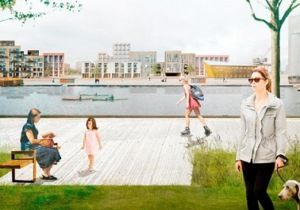News
Business News in Brief: Harbour towns transforming industrial areas into hip downtown locations
This article is more than 6 years old.
In other stories, a hotel chain has bought Falck’s old HQ and Danish industry is launching a major promotional effort in South Korea

If all goes according to plan Næstved’s old harbour could look like this (artist’s impression, Næstved Kommune)
Næstved in southern Zealand is the latest in a long line of harbour towns to come up with ambitious development plans to rejuvenate old industrial plants and create new and attractive city districts.
If approved, a new local plan will see the harbour area redeveloped over the next 20-30 years to include housing for 6,000 people, shops, cafes and a big new swimming pool, reports DR Nyheder.
Paddle your own canoe
“We hope we can get pleasure boats to use the harbour and that some of our clubs, such as the canoe and kayak club, will be interested in moving in. We also hope that 6,000 people will be able to live there in different types of housing,” said the town’s mayor, Carsten Rasmussen.
According to Rasmussen, it will cost around a billion kroner to realise the project and already a number of investors have shown some interest.
Active in the major cities
Similar projects have been successfully launched in Aarhus, Copenhagen and Holbæk, while a project in Randers started in 2014 is still underway.
Odense Municipality has a plan for its harbour that includes around 2,500 new housing units expected to be completed by 2028.
Falck’s old HQ set to become hotel
Since 1962, Falck-Huset on Copenhagen’s Polititorvet has been the headquarters of the Danish rescue organisation. In November, Falck moved to Sydhavn and the old HQ has been bought by the brothers Henning and Birger Arp-Hansen, who own the biggest chain of private hotels in Denmark, reports Finans. Situated next to the hotel chain’s Wakeup Copenhagen hotel, the old Falck building is expected to be converted into “something within the realms of the overnight stay industry”, explained Dorte Krak in a mail to Finans.
READ MORE: Not a-Falcking-gain! The family company with a history of sharp business practices
Danish industry to make a play for South Korean business
From May 20-22 a large delegation representing around 40 Danish companies will be heading to the South Korean capital Seoul. With the Crown Prince and Princess at its head, the delegation will be aiming to strengthen Danish exports, especially in the fields of sustainable technology, foodstuffs, lifestyle products, and health and welfare solutions. The visit also commemorates 60 years of diplomatic relations between the two countries.










































